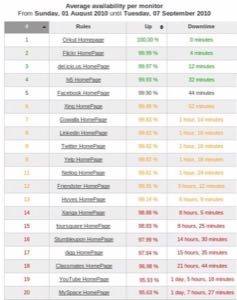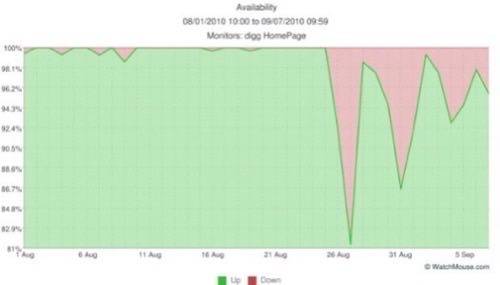Netherlands-based website monitoring company WatchMouse has created a public website dedicated to measuring performance at social networking sites including Facebook, Twitter, Foursquare, LinkedIn, Del.icio.us, Digg, Xanga and Flickr.

WatchMouse also release uptime statistics for the top 20 social sites for the month of August. The leaders were Orkut, which had no downtime, Flickr with just four minutes of downtime, Del.icio.us with 12 minutes of downtime and the gaming site hi5 with 32 minutes of downtime.
Digg was in the bottom five with 15 hours and 35 minutes (2.16%) downtime due to issues with its relaunch. Other relatively poor performers included MySpace with a day, seven hours and 27 minutes of downtime (4.36%) and YouTube with a day, five hours and 18 minutes or 4.07% downtime.

Twitter was only down for an hour and 16 minutes total all month, tied with LinkedIn and Yelp.
Uptime for the top 20 social networking sites monitored by WatchMouse:

WatchMouse started monitoring the performance of 26 application programming interfaces (APIs) popular with app developers, including Facebook, Twitter, Salesforce.com and Posterous back in January. Now it’s extending its monitoring services to users as well as programmers with Social.DownorNot.com.
“Revealing information frequently and often – both good and bad – is the only way to amass positive impressions, reduce interactions with higher cost-per-contact channels, and directly influence your reputation,” Mark Pors, CTO and co-founder of WatchMouse, said in a press release. “Most of the social networking companies we monitor on Social.DownorNot.com do not have a dedicated place where they can broadcast when their services are not working correctly.”
The data comes from the companies via WatchMouse’s Public Status Pages, the system that updates Twitter’s API status. WatchMouse’s Public Status Pages let any company announce maintenance, site issues or that the site is functioning perfectly. Users can also see a seven-day history with graphs, a 24-hour snapshot and breakdown by country.
Digg’s uptime suffered terribly during a bumpy relaunch.

The idea is that it’s better to let users know what’s going on than to leave them guessing. Being upfront about downtime will cut down on complaints and generate goodwill among developers and users. What do you think? Will this keep users and developers happy? Or will it just be a frustrating reminder of a site’s shortcomings?










